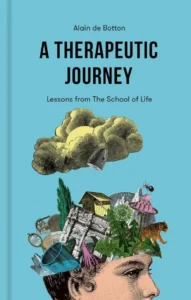Alain de Botton on the Qualities of a Healthy Mind
INSPIRATIONAL, 13 Nov 2023
Maria Popova | The Marginalian – TRANSCEND Media Service
“The mind is its own place, and in it self can make a Heav’n of Hell, a Hell of Heav’n,” Milton wrote centuries before modern science came to illuminate how the mind renders reality — the mind, this sole lens we have on what the world is and what we are. The quality of our mind, then — the clarity of it, the composure of it — shapes the quality of our lives. Viktor Frankl knew this when he observed amid the most unimaginable of circumstances — the barbed-wire inside of a concentration camp — that “everything can be taken from a man but one thing: the last of the human freedoms — to choose one’s attitude in any given set of circumstances.” That choice, that attitude, is what we call mindset, and it is as trainable as a muscle, as teachable as piano.
How to cultivate a mind that faces the gauntlet of living without making of it a hell is what Alain de Botton, philosopher of poetic pragmatism, explores in A Therapeutic Journey: Lessons from The School of Life (public library).
Recognizing that the mind is at bottom an attention machine — and, as cognitive scientist Alexandra Horowitz observed in her exquisite experiment in widening the lens, “attention is an intentional, unapologetic discriminator [that] asks what is relevant right now, and gears us up to notice only that” — De Botton writes:
A mind in a healthy state is, in the background, continually performing a near-miraculous set of maneuvers that underpin our moods of clear-sightedness and purpose… A healthy mind is an editing mind, an organ that manages to sieve, from thousands of stray, dramatic, disconcerting, or horrifying thoughts, those particular ideas and sensations that actively need to be entertained in order for us to direct our lives effectively.
A mind at its best, De Botton argues, is equally capable of self-compassion and of what Iris Murdoch so wonderfully termed unselfing. He writes:
A well-functioning mind recognizes the futility and cruelty of constantly finding fault with its own nature… [It] can quieten its own buzzing preoccupations in order, at times, to focus on the world beyond itself.
Undergirding his formulation of a healthy mind is the intimation that cynicism is the unhealthiest of mindsets and the surest pathway to despair:
A healthy mind knows how to hope; it identifies and then hangs on tenaciously to a few reasons to keep going. Grounds for despair, anger, and sadness are, of course, all around. But the healthy mind knows how to bracket negativity in the name of endurance. It clings to evidence of what is still good and kind. It remembers to appreciate; it can — despite everything — still look forward to a hot bath, some dried fruit or dark chocolate, a chat with a friend, or a satisfying day of work. It refuses to let itself be silenced by all the many sensible arguments in favor of rage and despondency.
Complement with neuroscientist Antonio Damasio on the relationship between the body and the mind and psychologist Carol Dweck’s pioneering framework of the two basic mindsets that shape our lives (and how to cultivate the far more fruitful one), then revisit Alain de Botton on what emotional maturity really means and the importance of breakdowns.
_______________________________________
 My name is Maria Popova — a reader, a wonderer, and a lover of reality who makes sense of the world and herself through the essential inner dialogue that is the act of writing. The Marginalian (which bore the unbearable name Brain Pickings for its first 15 years) is my one-woman labor of love, exploring what it means to live a decent, inspired, substantive life of purpose and gladness. Founded in 2006 as a weekly email to seven friends, eventually brought online and now included in the Library of Congress permanent web archive, it is a record of my own becoming as a person — intellectually, creatively, spiritually, poetically — drawn from my extended marginalia on the search for meaning across literature, science, art, philosophy, and the various other tendrils of human thought and feeling. A private inquiry irradiated by the ultimate question, the great quickening of wonderment that binds us all: What is all this? (More…)
My name is Maria Popova — a reader, a wonderer, and a lover of reality who makes sense of the world and herself through the essential inner dialogue that is the act of writing. The Marginalian (which bore the unbearable name Brain Pickings for its first 15 years) is my one-woman labor of love, exploring what it means to live a decent, inspired, substantive life of purpose and gladness. Founded in 2006 as a weekly email to seven friends, eventually brought online and now included in the Library of Congress permanent web archive, it is a record of my own becoming as a person — intellectually, creatively, spiritually, poetically — drawn from my extended marginalia on the search for meaning across literature, science, art, philosophy, and the various other tendrils of human thought and feeling. A private inquiry irradiated by the ultimate question, the great quickening of wonderment that binds us all: What is all this? (More…)
Go to Original – themarginalian.org
Tags: Inspirational, Life, Mind, World
DISCLAIMER: The statements, views and opinions expressed in pieces republished here are solely those of the authors and do not necessarily represent those of TMS. In accordance with title 17 U.S.C. section 107, this material is distributed without profit to those who have expressed a prior interest in receiving the included information for research and educational purposes. TMS has no affiliation whatsoever with the originator of this article nor is TMS endorsed or sponsored by the originator. “GO TO ORIGINAL” links are provided as a convenience to our readers and allow for verification of authenticity. However, as originating pages are often updated by their originating host sites, the versions posted may not match the versions our readers view when clicking the “GO TO ORIGINAL” links. This site contains copyrighted material the use of which has not always been specifically authorized by the copyright owner. We are making such material available in our efforts to advance understanding of environmental, political, human rights, economic, democracy, scientific, and social justice issues, etc. We believe this constitutes a ‘fair use’ of any such copyrighted material as provided for in section 107 of the US Copyright Law. In accordance with Title 17 U.S.C. Section 107, the material on this site is distributed without profit to those who have expressed a prior interest in receiving the included information for research and educational purposes. For more information go to: http://www.law.cornell.edu/uscode/17/107.shtml. If you wish to use copyrighted material from this site for purposes of your own that go beyond ‘fair use’, you must obtain permission from the copyright owner.
